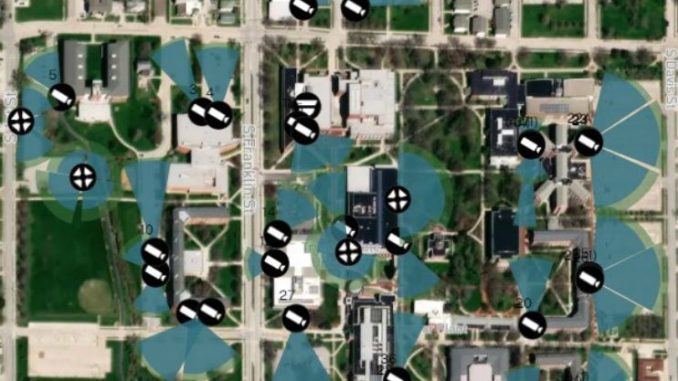
Truman State University has begun the process of installing 76 security cameras across campus. These cameras are meant to provide added security and crime deterrence at the University.
According to the Board of Governors, the cost of installing the cameras will be $331,884 for five years. Hardware, programming and training will cost $162,017. Electrical, cabling and boring will cost $150,667. A three-year service agreement will cost $11,520. Along with this servicing them will cost $3,840 for years for and five. Sam Guth, physical plant director at the University, said the contractor that the University hired for the project is Communications Technology Incorporated out of St. Louis.
Guth said the plan is to have all cameras installed by Aug. 1. Over the summer, members of the Department of Public Safety and Information Technology Services will be trained on how to use the system. DPS will have exclusive access to the system except for ITS’s normal maintenance of it.
Guth said the cameras will be installed on poles in parking lots as well as on buildings. Some boring will have to be completed to wire the cameras along with indoor wiring occurring in certain buildings. The campus has been divided into quadrants and installation will take place over phases. The goal is to avoid disrupting school or the numerous camps that Truman hosts over the summer.
“They won’t be inconspicuous; they are not hidden cameras by any means. They’re full-size, outdoor cameras that are weather resistant. There are a multitude of types, some of them have better nighttime resolution than others at certain spots. Using the ambient light from the parking lots and stuff like that, some cameras don’t need to be enhanced because we have the lights on all night,” Guth said.
Guth explained that this is a well-designed project that was designed with the students in mind. It emerged from requests from students and parents over the years.
Sara Seifert, Chief of the Department of Public Safety, said the cameras are being installed to provide added security to the campus. Much of it will be perception as there will be warnings that people are under surveillance.
The cameras themselves will not be monitored 24/7. What the cameras record will be available for playback if there is an issue on campus. The goal is to bring a sense of security to students and up the department’s clearance rate of crimes committed on campus.
Seifert said cameras are going to be placed in strategic locations across campus. Places that have seen more crime than other areas, such as parking lots and bike racks, will host the bulk of the 76 cameras. Only one indoor camera will be placed in the business office in McClain.
DPS will be the main hub for reviewing, training and accessing the cameras. The two people at DPS who will be predominantly trained to handle the cameras on the campus will be Seifert herself and Sergeant Jeremey Cordray. They were heavily involved in the selection process of the cameras and choosing where the cameras needed to go.
Cordray will have the ability to burn off disks if something happens on campus. Department police officers will have the ability to save recorded sections if an event occurs, but have to receive permission from Cordray to have recordings burned onto a disk. Seifert will oversee this whole process.
Seifert said the security camera company the University went with is Avigilon. She explained that one reason why they chose them is because of them being easy to work with. Most of the training to use the cameras will be online.
According to Guth and Seifert, March 25 was the start date of the project as groups such as the Physical Plant and the Department of Public Safety met with the contractors.
